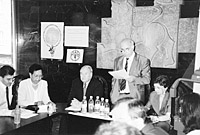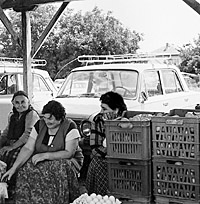


Dans un exemple de travail d'équipe basé sur l'innovation dans le cadre du Programme des experts invités, quatre chercheurs de l'Institut de sociologie de l'Académie bulgare des sciences ont conçu et testé une méthodologie permettant d'étudier les relations entre les sexes dans l'agriculture, et de disposer de statistiques sur les producteurs de denrées alimentaires dans les zones rurales. Le projet a été élaboré et géré par Mme Detelina Radoeva, attachée de recherche au Service des femmes dans le développement de la Division de la femme et de la population, Département du développement durable de la FAO.
Le projet a consisté à concevoir un ensemble d'instruments et de techniques pour réunir et analyser des données sur les travailleurs ruraux des deux sexes en Bulgarie. Il s'agissait d'élaborer une série d'instruments et une méthodologie de nature à permettre la collecte de données comparables au sein d'une même région ou dans le cadre de plusieurs régions, les instruments étant toutefois conçus pour tenir compte des particularités de celles-ci.
Como ejemplo innovador de trabajo de equipo en el ámbito del Programa de expertos visitantes, cuatro investigadores del Instituto de Sociología de la Academia Búlgara de Ciencias desarrollaron y verificaron una metodología para estudiar las relaciones de género en la agricultura y mejorar la disponibilidad de datos estadísticos sobre productores de alimentos en las zonas rurales. El proyecto fue ideado y administrado por Detelina Radoeva, Oficial de investigación en el Servicio de la Mujer en el Desarrollo, Dirección de la Mujer y la Población, Departamento de Desarrollo Sostenible, de la FAO.
El proyecto comprendía la producción de juegos de herramientas y técnicas para recoger y analizar datos sobre trabajadores rurales tanto hombres como mujeres en Bulgaria. La idea consistía en desarrollar una serie de instrumentos así como una metodología que pudieran utilizarse para compilar datos comparables dentro de las regiones y también entre diferentes regiones, al mismo tiempo que se adecuaban esos instrumentos para tener en cuenta las características propias de cada región.
![]()
In an innovative example of teamwork under the Visiting Experts from Academic and Research Institutions Programme, four researchers from the Institute of Sociology of the Bulgarian Academy of Sciences developed and tested a methodology to study gender relations in agriculture and improve the availability of statistical data on food producers in rural areas. The project was designed and managed by Detelina Radoeva, Research Officer in the Women in Development Service, Women and Population Division, Sustainable Development Department of FAO.
In many countries, including economies in transitionof Central and Eastern Europe, systematic statistics on labour force participation and division of labour, decision-making and access to food

Todor Kavaldjiev (seated third from left), Vice-President of Bulgaria, at the opening session of the Workshop on Women in Agriculture - Development Plan of Action, held in Sofia from 17 to 21 June 1998 |
Designed in five phases, the study aimed to: collect and analyse data on men's and women's roles, types of work, workloads and productivity in agriculture; analyse gender inequalities and inequalities in the structure of occupations, decision-making and access to resources in Bulgarian agriculture, reflecting FAO's priorities in gender mainstreaming; field-test cost-effective ways of collecting separate data on men and women producers; produce guidelines for the translation of gender analysis into policy recommendations and use the field-tested techniques in order to organize subsequently systematic data collection on a regional level in Balkan and Eastern and Central European economies in transition.
The project, to which team members contributed their individual expertise at all stages, involved producing a set of tools and techniques for the collection and analysis of data on male and female rural workers in Bulgaria. The idea was to develop a set of tools and a methodology that could be used to collect comparable data within and also between different regions, while tailoring these tools to take account of characteristics specific to regions.
The prototype developed by the Bulgarian team is now being adapted for use in Africa. In some African countries, for example, polygamy is a family characteristic, whereas in the economies in transition it does not exist. In the economies in transition, on the other hand, the problem of restitution of nationalized land has had a disruptive effect on agriculture, and the process of transition has damaged the sector to the point of threatening food security in some countries.
The project developed the initial research of an FAO-sponsored survey, "Men and women in Bulgarian agriculture: division of labour, decision-making and access to resources", which was carried out by the team at the Institute of Sociology, Bulgarian Academy of Sciences. The results of the survey were presented at a workshop held from 17 to 21 June 1998 in Sofia, Bulgaria.
The results of the pioneering survey of agricultural workers in 120 villages nationwide indicate that women and men participate equally in most major agricultural work. There is no strict division of labour by gender, except in the production of cereals (ploughing, seeding and harvesting, etc.), as well as in haymaking and forage preparation, which are done exclusively by men. Women's work prevails in activities connected

Women farmers at a fruit and vegetable market in Bulgaria |
Women also take part in the decisions concerning agricultural production, mainly what should be produced and which product and how much of it should be sold. Nevertheless, this role is not sufficient to change women's lower status in rural communities. Men are more often the decision-makers for the more important matters - levels of investment, what machinery and equipment to buy and how to organize the work that needs to be done.
In general, under the conditions of slow and painful transformation to a market economy, many rural dwellers, especially women, feel that higher unemployment in rural areas and the lack of alternative occupations compel them to work alone in subsistence farming. The results of the study indicate that modernization of agricultural production is essential to achieve higher productivity in Bulgarian agriculture and a higher standard of living in rural areas, both necessary conditions for real gender equality.